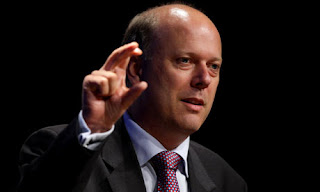They're really saying I love you'
Monday, 20 December 2010
Christ in Christmas?
They're really saying I love you'
Sunday, 12 September 2010
A Brilliant Article
Tuesday, 7 September 2010
More thoughtless thought
"Women should be silent in the churches. For they are not permitted to speak, but should be subordinate, as the law also says."
Friday, 20 August 2010
Dawkins on Faith Schools
Thursday, 19 August 2010
Religious Conscience vs The Rights of the Child
Friday, 6 August 2010
A 'thought'
 Meet Wale Babatunde...senior pastor of the World Harvest Christian Centre.
Meet Wale Babatunde...senior pastor of the World Harvest Christian Centre. Sunday, 1 August 2010
Meeting Jesus Again for the First Time

The book is one I would recommend to anyone who, like me, may have grown up with an image of Jesus as God's Son sent to earth to bear the punishment for my sins, to be sacrificed for my sake. If you are, or have the suspicion you may soon be, at the stage where the notions of sin and hell and judgement and Jesus bearing God's wrath become either stale, or tasteless, or no longer concepts to which you can relate, this book is most definitely for you.
Far from being what many conservative Christians would consider liberal theology to be - watering down scripture, removing what is significant from the heart of the Christian faith and leaving you with nothing of any meaning - in Meeting Jesus Again for the First Time Marcus Borg focuses on truths about who Jesus was which are so often neglected by the church and modern Christians in favour of one specific strand of theology which is actually based on a very small amount of the comparatively large New Testament Gospels, and upon only one of the three most significant stories of the Old Testament (which, for Borg, are the Exodus from Egypt, the exile to Babylon and the Priestly Story; the dominant doctrines of salvation, atonement, etc. are purely based on the latter of the three, and pay no attention whatsoever to the former two).
As I have probably made quite clear by now (!) I thoroughly recommend this book. You may not agree with everything Borg thinks (I myself don't, either), but there is compelling truth in this book that presents Jesus in a way which is far removed from the almost cringeworthy picture which is proclaimed ad nauseam by evangelical Christianity.
I conclude with some words from Marcus Borg himself:
For those of us who grew up in the church, believing in Jesus was important. For me...that phrase used to mean...'believing things about Jesus'. To believe in Jesus meant to believe what the gospels and the church said about Jesus. That was easy when I was a child, and became more and more difficult as I grew older...
Believe did not originally mean believing a set of doctrines or teachings; in both Greek and Latin its roots mean 'to give one's heart to'. The 'heart' is the self at its deepest level...Believing in Jesus does not mean believing doctrines about him. Rather, it means to...give one's self at its deepest level, to the post-Easter Jesus who is the living Lord, the side of God turned toward us, the face of God, the Lord who is also the Spirit'.
As a friend of mine frequently says, 'amen to that, brother!'.
Thursday, 8 July 2010
Developments and Regressions

What a mixed day in the world of current affairs. As an unashamed liberal, I progressed through the newspaper and went from depressed, to even more depressed, to feeling a glimmer of hope. Three news stories which I care deeply about.
- An act being morally wrong in someone's eyes does not constitute grounds for taking someone's life;
- Despite a lack of evidence and pleas of herself and her son that she was innocent, she was found guilty;
- She was given the horrendous punishment of 99 lashes and told the case was finished (however, she was then accused of murder, acquitted of murder but re-condemned for the suspected adultery)
- It is not an acceptable attitude of any religious believer to follow archaic laws demanding criminals to be killed; it is not the place of humans to take other human beings' lives

- "I don't object to gay people [through gritted teeth] but this issue is a matter of the country being too full, not of homosexuality"
- "The country will become full of people pretending to be gay to be granted asylum in the UK"
- There is no proof that people are being persecuted in their own countries
- People could just hide their homosexuality and should if they want to be free from persecution
Sunday, 2 May 2010
he doxa tou theou (The glory of God)
"The glory of God is a human being fully alive".
Over the past few months I've been meditating and reflecting upon the meaning of faith and the nature of God. For years I was obsessed with this idea that everyone had to be converted, and it was my place to go round preaching at people, judging their actions and shouting quotes from the Bible at them.
It's only really recently that I've matured and mellowed. Or, to put it more bluntly, I've grown up, and I've calmed down. And I feel that in this state I have, for perhaps the first time, begun to really sense the nature of God more fully. Obviously the Almighty is far too complex and above our understanding, and I wouldn't ever profess to have the confidence to grasp him/her. But what I feel the Divine has conveyed to me repeatedly is the crucial importance of love. Love for God is love for humanity. Love for God isn't preaching at people and telling them they're damned for eternity for not believing what you believe. Love for God is loving your parent, your partner, your friend, and no less your enemy, your persecutor, the stranger on the street, the stranger you may never meet.
What I pray is that I may one day glimpse how God sees His creation; seeing every person, woman, man, adult, child, black, brown, white, gay, straight, happy, unhappy, Hindu, Christian; as his beloved child. And I pray that I may always remember, whenever I see another human being, that the glory of God really is seen where a human being is fully alive.
Saturday, 3 April 2010
Public Equality vs Personal Conscience

Ever since the implementation of the bill making it illegal to discriminate on the basis of sexual orientation, numerous debates have ensued. Inevitably the same questions have been banded around: what about the rights of the religious believer? Whose rights matter more? Do people's consciences not matter? And, on the other side of the discussion - how can we ever attain equality? How far is discrimination acceptable?
I have decided, albeit hesitantly, to at least explore this issue. My stimulus is the news that Shadow Home Secretary, Chris Grayling, stated that, in his view: "if it's a question of somebody who's doing a B&B in their own home, that individual should have the right to decide who does and who doesn't come into their own home".
When he puts it like that, it seems reasonable. However - the fact is, these people have chosen to operate a business in their home. As a corollary, their home, as the premises of the business, must surely be treated as the premises of any other business? Grayling himself claims that it would not be reasonable to allow a hotel to discriminate on who they allowed to stay in the 21st century. Why is a B&B different simply because it is run from the couple's home? If they know they are going to find it difficult to admit up to 10% of potential guests, is it really wise to set up such a business in the first place?
As Christ himself said: "‘Give therefore to the emperor the things that are the emperor’s" (Matt 20:21). In an age where equality is the goal, it cannot be acceptable for any business owner to pick and choose to whom they provide a service. Otherwise we must ask where the cut-off point is. Are Christian shopkeepers allowed to choose not to serve divorcees? (Incidentally, Jesus had a lot more to say about divorce than he did about homosexuality). Or perhaps atheist B&B owners who find Christian beliefs offensive should be allowed to ban them as guests? Maybe homophobic pub owners should be allowed to refrain from selling alcohol to homosexuals?
Some Christians interpret the Bible to mean that God doesn't like gay people. They therefore find homosexuals offensive. But our society, which aims for people of all races, religions, sexual orientations, political and religious views to be able to live in harmony with one another, finds such discrimination offensive.
For Christians who would struggle as the B&B owners to admit gay couples, or Muslims, or atheists, or anyone else whose beliefs/lifestyles offend them, perhaps they ought to consider that (1) setting up a business in an egalitarian society isn't the best idea; (2) If their convictions really are correct, will Jesus really condemn them for simply allowing them to stay in their B&B? They're not exactly joining in(!)
